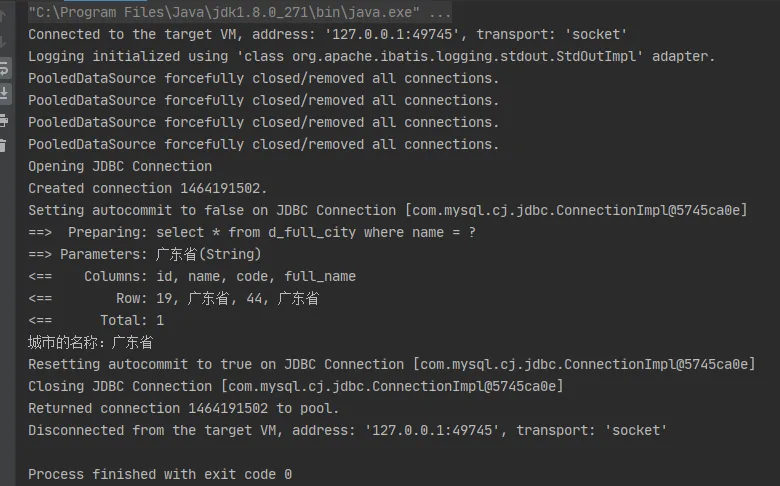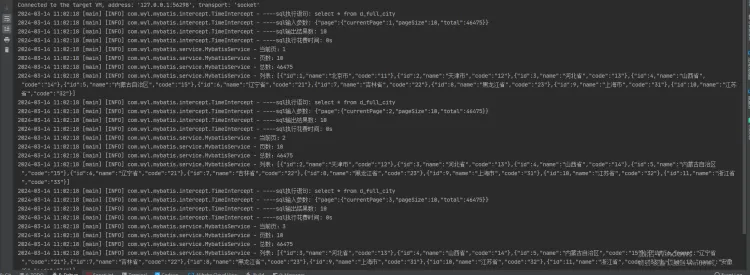mybatis实践篇(一)
原创大约 5 分钟
日志(logImpl)
StdOutImpl
<setting name="logImpl" value="org.apache.ibatis.logging.stdout.StdOutImpl"/>

Slf4jImpl
<setting name="logImpl" value="org.apache.ibatis.logging.slf4j.Slf4jImpl"/>
引入maven文件
<dependency>
<groupId>org.slf4j</groupId>
<artifactId>slf4j-simple</artifactId>
<version>2.0.12</version>
</dependency>
编写配置文件
org.slf4j.simpleLogger.defaultLogLevel=debug
org.slf4j.simpleLogger.showDateTime=true
org.slf4j.simpleLogger.dateTimeFormat=yyyy-MM-dd HH:mm:ss
org.slf4j.simpleLogger.levelInBrackets=true
org.slf4j.simpleLogger.logFile=System.out

执行器
默认执行器(SimpleExecutor)
try(SqlSession sqlSession = sqlSessionFactory.openSession()) {
// 使用SqlSession获取映射器实例
FullCityMapper mapper = sqlSession.getMapper(FullCityMapper.class);
// 使用映射器执行操作
FullCity fullCity = mapper.selectByName("广东省");
System.out.println("城市的名称:"+fullCity.getName());
}
重用执行器(ReuseExecutor)
try(SqlSession sqlSession = sqlSessionFactory.openSession(ExecutorType.REUSE)) {
// 使用SqlSession获取映射器实例
FullCityMapper mapper = sqlSession.getMapper(FullCityMapper.class);
// 使用映射器执行操作
FullCity fullCity = mapper.selectByName("广东省");
System.out.println("城市的名称:"+fullCity.getName());
}
批量执行器(BatchExecutor)
try(SqlSession sqlSession = sqlSessionFactory.openSession(ExecutorType.BATCH)) {
// 使用SqlSession获取映射器实例
FullCityMapper mapper = sqlSession.getMapper(FullCityMapper.class);
// 使用映射器执行操作
FullCity fullCity = mapper.selectByName("广东省");
System.out.println("城市的名称:"+fullCity.getName());
}
起别名
配置文件
<typeAliases>
<!-- <typeAlias type="com.wyl.mybatis.entity.FullCity"/>-->
<package name="com.wyl.mybatis.entity"/>
</typeAliases>
mapper文件
<select id="selectByName" resultType="FullCity">
select * from d_full_city where name = #{name}
</select>
插件
注解
@Documented
@Retention(RetentionPolicy.RUNTIME)
@Target(ElementType.TYPE)
public @interface Intercepts {
/**
* Returns method signatures to intercept.
*
* @return method signatures
*/
Signature[] value();
}
@Documented
@Retention(RetentionPolicy.RUNTIME)
@Target({})
public @interface Signature {
// Executor.class
Class<?> type();
// update
String method();
// MappedStatement.class, Object.class
Class<?>[] args();
}
主要用到了上面两个注解:@Intercepts和@Signature 方法名和参数的定义如下: 
时间插件
作用:打印SQL语句执行的时间,分析慢查询原因(一般针对查询query来说)
package com.wyl.mybatis.intercept;
import cn.hutool.json.JSONArray;
import cn.hutool.json.JSONUtil;
import org.apache.ibatis.binding.MapperMethod;
import org.apache.ibatis.executor.Executor;
import org.apache.ibatis.mapping.BoundSql;
import org.apache.ibatis.mapping.MappedStatement;
import org.apache.ibatis.plugin.Interceptor;
import org.apache.ibatis.plugin.Intercepts;
import org.apache.ibatis.plugin.Invocation;
import org.apache.ibatis.plugin.Signature;
import org.apache.ibatis.session.ResultHandler;
import org.apache.ibatis.session.RowBounds;
import org.slf4j.Logger;
import org.slf4j.LoggerFactory;
import java.lang.reflect.Method;
import java.util.HashMap;
import java.util.Map;
/**
* @Description 时间插件
* @Author WuYiLong
* @Date 2024/2/29 9:51
*/
@Intercepts({@Signature(
type = Executor.class,
method = "query",
args = {
MappedStatement.class,
Object.class,
RowBounds.class,
ResultHandler.class
})})
public class TimeIntercept implements Interceptor {
private final static Logger log = LoggerFactory.getLogger(TimeIntercept.class);
@Override
public Object intercept(Invocation invocation) throws Throwable {
Object[] args = invocation.getArgs();
MappedStatement ms = (MappedStatement)args[0];
MapperMethod.ParamMap pm = ( MapperMethod.ParamMap) args[1];
Map<String, Object> paramsMap = new HashMap<>();
pm.forEach((k,v)->{
String key = String.valueOf(k);
if(!key.contains("param")) {
paramsMap.put(String.valueOf(k),v);
}
});
BoundSql boundSql = ms.getBoundSql(ms.getParameterMap());
// sql执行之前
long startTime = System.currentTimeMillis();
Object proceed = invocation.proceed();
JSONArray jsonArray = JSONUtil.parseArray(proceed);
long endTime = System.currentTimeMillis();
log.info("----sql执行语句: {}",boundSql.getSql());
log.info("----sql输入参数: {}", JSONUtil.toJsonStr(paramsMap));
log.info("----sql输出结果数: {}", jsonArray.size());
log.info("----sql执行花费时间: {}", (endTime-startTime)/1000);
// sql执行之后
return proceed;
}
}
<plugins>
<plugin interceptor="com.wyl.mybatis.intercept.TimeIntercept"></plugin>
</plugins>
分页插件
FullCityMapper mapper = sqlSession.getMapper(FullCityMapper.class);
for (int i = 1; i <= 3 ; i++) {
Page<FullCity> page = new Page<>(i, 10);
List<FullCity> fullCities = mapper.selectFullCityPage(page);
log.info("当前页:{}",page.getCurrentPage());
log.info("页数:{}",page.getPageSize());
log.info("总数:{}",page.getTotal());
log.info("列表:{}", JSONUtil.toJsonStr(fullCities));
}
作用:mysql数据库物理分页,简化分页流程
package com.wyl.mybatis.page;
import java.util.List;
/**
* @Description
* @Author WuYiLong
* @Date 2024/3/13 13:48
*/
public class Page<T> {
private Integer currentPage = 1;
private Integer pageSize = 10;
private Integer total;
private List<T> records;
public Page(Integer currentPage,Integer pageSize) {
this.currentPage = currentPage;
this.pageSize = pageSize;
}
public Page(){};
public Integer getCurrentPage() {
return currentPage;
}
public void setCurrentPage(Integer currentPage) {
this.currentPage = currentPage;
}
public Integer getPageSize() {
return pageSize;
}
public void setPageSize(Integer pageSize) {
this.pageSize = pageSize;
}
public Integer getTotal() {
return total;
}
public void setTotal(Integer total) {
this.total = total;
}
public List<T> getRecords() {
return records;
}
public void setRecords(List<T> records) {
this.records = records;
}
}
/**
* 分页
* @param page
* @return
*/
@Select("select * from d_full_city")
List<FullCity> selectFullCityPage(@Param("page") Page page);
package com.wyl.mybatis.intercept;
import cn.hutool.db.sql.SqlBuilder;
import com.alibaba.druid.DbType;
import com.alibaba.druid.sql.SQLUtils;
import com.alibaba.druid.sql.ast.SQLStatement;
import com.alibaba.druid.sql.ast.statement.SQLSelectStatement;
import com.alibaba.druid.sql.dialect.mysql.ast.statement.MySqlSelectQueryBlock;
import com.wyl.mybatis.config.SqlSessionFactoryConfig;
import com.wyl.mybatis.page.Page;
import com.wyl.mybatis.util.SqlParamUtil;
import org.apache.ibatis.cache.CacheKey;
import org.apache.ibatis.executor.Executor;
import org.apache.ibatis.mapping.BoundSql;
import org.apache.ibatis.mapping.MappedStatement;
import org.apache.ibatis.plugin.*;
import org.apache.ibatis.session.ResultHandler;
import org.apache.ibatis.session.RowBounds;
import org.apache.ibatis.session.SqlSession;
import org.apache.ibatis.session.SqlSessionFactory;
import org.slf4j.Logger;
import org.slf4j.LoggerFactory;
import java.sql.Connection;
import java.sql.PreparedStatement;
import java.sql.ResultSet;
import java.util.List;
import java.util.Map;
/**
* @Description
* @Author WuYiLong
* @Date 2024/3/13 12:06
*/
@Intercepts({
@Signature(
type = Executor.class,
method = "query",
args = {
MappedStatement.class,
Object.class,
RowBounds.class,
ResultHandler.class
}),
@Signature(
type = Executor.class,
method = "query",
args = {MappedStatement.class,
Object.class,
RowBounds.class,
ResultHandler.class,
CacheKey.class,
BoundSql.class})})
public class PageIntercept implements Interceptor {
private final static Logger log = LoggerFactory.getLogger(PageIntercept.class);
@Override
public Object intercept(Invocation invocation) throws Throwable {
Executor executor = (Executor) invocation.getTarget();
Object[] args = invocation.getArgs();
MappedStatement ms = (MappedStatement) args[0];
Object params = args[1];
RowBounds rowBounds = (RowBounds) args[2];
BoundSql boundSql = ms.getBoundSql(params);
String sql = boundSql.getSql();
ResultHandler resultHandler = (ResultHandler) args[3];
Page page = null;
Map<String, Object> paramMap = SqlParamUtil.filter(params);
for (Map.Entry<String, Object> mapEntry : paramMap.entrySet()) {
Object v = mapEntry.getValue();
if (v instanceof Page) {
page = (Page) v;
}
}
if(page != null) {
String countSql = countSql(sql);
int count = 0;
SqlSessionFactory sqlSessionFactory = SqlSessionFactoryConfig.buildSqlSessionFactory();
try (SqlSession sqlSession = sqlSessionFactory.openSession()) {
Connection connection = sqlSession.getConnection();
PreparedStatement preparedStatement = connection.prepareStatement(countSql);
ResultSet resultSet = preparedStatement.executeQuery();
while (resultSet.next()) {
count = resultSet.getInt("count");
}
}
page.setTotal(count);
rowBounds = new RowBounds(page.getCurrentPage()-1,page.getPageSize());
}
CacheKey cacheKey;
if (args.length == 4) {
cacheKey = executor.createCacheKey(ms, params, rowBounds, boundSql);
} else {
cacheKey = (CacheKey) args[4];
boundSql = (BoundSql) args[5];
}
List<Object> query = executor.query(ms, params, rowBounds, resultHandler, cacheKey, boundSql);
return query;
}
@Override
public Object plugin(Object target) {
if (target instanceof Executor) {
return Plugin.wrap(target, this);
}
return target;
}
private String countSql(String sql) {
SqlBuilder sqlBuilder = new SqlBuilder();
sqlBuilder.select("count(*) count");
List<SQLStatement> sqlStatements = SQLUtils.parseStatements(sql, DbType.mysql);
SQLSelectStatement sqlStatement = (SQLSelectStatement) sqlStatements.get(0);
MySqlSelectQueryBlock queryBlock = (MySqlSelectQueryBlock) sqlStatement.getSelect().getQueryBlock();
sqlBuilder.from(queryBlock.getFrom().toString());
if (queryBlock.getWhere() != null) {
sqlBuilder.where(queryBlock.getWhere().toString());
}
return sqlBuilder.build();
}
}
<plugins>
<plugin interceptor="com.wyl.mybatis.intercept.PageIntercept"></plugin>
</plugins>

这里需要注意的是CacheKey缓存key,因为sql的变化直接影响了查询的输出,从上面可以看出分页参数,是不需要用户输入的,通过内置分页插件即可完成分页,所以说sql实质上是没有发生变化的,从而导致重新生成的缓存key都是一样的,如源码所示:
@Override
public CacheKey createCacheKey(MappedStatement ms, Object parameterObject, RowBounds rowBounds, BoundSql boundSql) {
if (closed) {
throw new ExecutorException("Executor was closed.");
}
CacheKey cacheKey = new CacheKey();
cacheKey.update(ms.getId());
cacheKey.update(rowBounds.getOffset());
cacheKey.update(rowBounds.getLimit());
cacheKey.update(boundSql.getSql());
List<ParameterMapping> parameterMappings = boundSql.getParameterMappings();
TypeHandlerRegistry typeHandlerRegistry = ms.getConfiguration().getTypeHandlerRegistry();
// mimic DefaultParameterHandler logic
for (ParameterMapping parameterMapping : parameterMappings) {
if (parameterMapping.getMode() != ParameterMode.OUT) {
Object value;
String propertyName = parameterMapping.getProperty();
if (boundSql.hasAdditionalParameter(propertyName)) {
value = boundSql.getAdditionalParameter(propertyName);
} else if (parameterObject == null) {
value = null;
} else if (typeHandlerRegistry.hasTypeHandler(parameterObject.getClass())) {
value = parameterObject;
} else {
MetaObject metaObject = configuration.newMetaObject(parameterObject);
value = metaObject.getValue(propertyName);
}
cacheKey.update(value);
}
}
if (configuration.getEnvironment() != null) {
// issue #176
cacheKey.update(configuration.getEnvironment().getId());
}
return cacheKey;
}
看到了cacheKey的update方法,所以我们只需要每次请求改变其中之一即可,很明显,我们改变下RowBounds对象的参数就好,这个对象也是控制行数的,从它的名字就可以直接看出来。
项目地址


